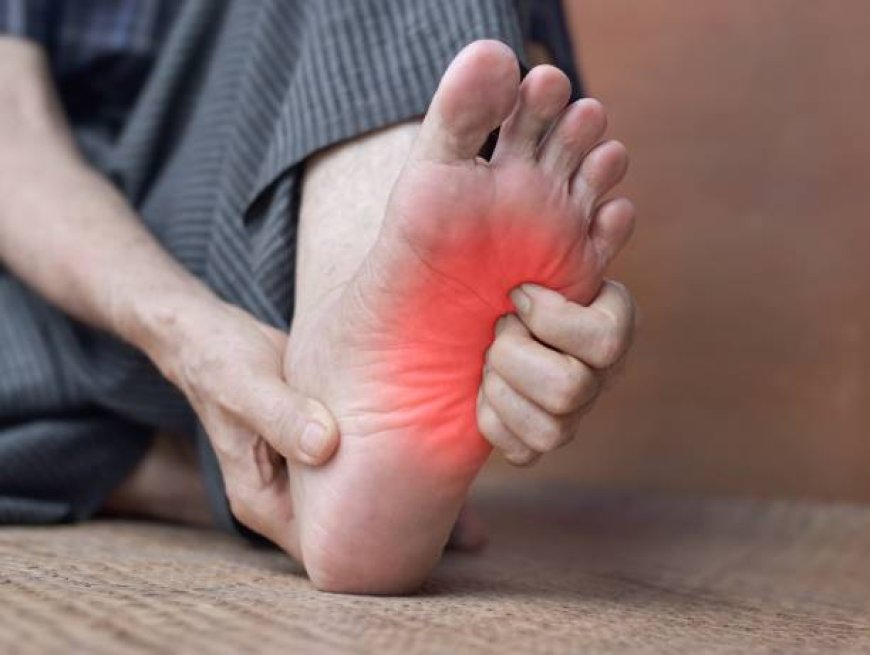Tingling in Hands and Feet: Causes, Treatments, and Prevention
Understanding the Tingling Sensation and When to See a Doctor

What Causes Tingling in the Feet and Hands?
Hand and foot tingling is a very frequent and annoying symptom. The medical word for this is paresthesia, which can also feel like pins and needles, numbness, or burning beneath the skin.
Frequently, the tingling sensation is harmless and transient. For instance, it could occur if you sleep with weight or pressure on one arm beneath your head. Alternatively, it can be the effect of strain on your nerves from prolonged leg crossing. In either scenario, relieving the pressure that generated the "pins and needles" effect quickly relieves the typically painless sensation.
But occasionally, tingling in the hands and feet can be strong, sporadic, or persistent. Other symptoms like discomfort, itching, numbness, and muscular atrophy may also be present. In these situations, tingling could indicate nerve damage resulting from a variety of conditions, including diabetes, bacterial or viral infections, traumatic or repeated stress injuries, and chemical exposures.

Tingling in the hands and feet is most commonly caused by damage to the nerves caused by peripheral neuropathy. The majority of diabetics—roughly two thirds—have mild to severe nerve damage. Image courtesy of Moment RF/Getty Images
Tingling in the hands and feet is most commonly caused by damage to the nerves caused by peripheral neuropathy. The majority of diabetics—roughly two thirds—have mild to severe nerve damage. Image courtesy of Moment RF/Getty Images
Peripheral neuropathy is the term for this kind of nerve damage, which typically affects the hands and feet and damages nerves far from the brain and spinal cord. The classification of peripheral neuropathy is greater than 100. If the problem worsens over time, you may become less mobile or maybe incapacitated. It is believed that over 20 million Americans, primarily elderly folks, suffer with peripheral neuropathy.
If your hands or feet have been tingling for a long time, you should seek medical attention immediately. You are less likely to experience long-term issues the sooner the source of your tingling is identified and treated.
Reasons for Tingling in the Feet and Hands
About 30% of cases of peripheral neuropathy are caused by diabetes, making it one of the most prevalent causes. Tingling and other symptoms are common in diabetic neuropathy; they generally begin in both feet, go up the legs, and then affect both hands and the arms. The majority of diabetics—roughly two thirds—have mild to severe nerve damage. These are frequently the initial indications of diabetes.
Related: Managing Myasthenia Gravis Despite Its Unpredictability
Thirty percent of instances with peripheral neuropathy have a "idiopathic" cause, meaning it is unknown. The remaining forty percent of instances result in tingling in either or both of the upper or lower limbs due to a variety of factors.
tingling in the hands
The following illnesses may result in tingling and numbness in the arms, hands, and fingers:
Squeezing your median nerve at the wrist can result in carpal tunnel syndrome, which causes tingling or numbness in your fingers and forearms. Carpal tunnel syndrome can be brought on by compressing the median nerve during pregnancy due to changes in the body, including fluid retention.
The nerve that provides feeling to the inside of your forearm, a portion of your palm, and your final two fingers might be affected by ulnar nerve entrapment syndrome, which can result in tingling in the fingers.
Stress on the nerve that runs along the bottom of your arm, such as when your arm is trapped between your head and a hard surface when you're drunk or asleep, can cause radial nerve palsy.
tingling in the feet
The following illnesses frequently result in tingling or numbness in the legs, toes, and feet:
Fibular neuropathy, another name for peroneal nerve palsy, is caused by injury to a nerve that runs down your leg. It may cause your foot to drop and affects the top of the foot or the outside of the leg.
The foot equivalent of carpal tunnel syndrome is called tarsal tunnel syndrome. This compresses the nerve that runs along the inside of your ankle.
Herniated disks in the lower back, which can compress nerves and produce tingling in the legs, are the cause of sciatica.
tingling in the feet and hands
Fear and anxiety. It can cause tingling on your face and around your mouth, as well as in your hands, fingers, feet, and toes.
The fibromyalgia. Both sets of limbs may become tingly as a result of this persistent discomfort condition.
Spondylosis in the neck. This usually happens when your neck's disks start to wear out and pressure the spinal column's nerves. Your hands, feet, legs, and arms may become numb or tingly if you have cervical spondylosis.
illnesses of the system. These include diseases of the kidneys, liver, arteries, blood-related conditions, amyloidosis, disorders of connective tissue, persistent inflammation, hormonal abnormalities (including hypothyroidism), malignancies, and benign tumors that encroach on nerves.
deficits in vitamins. For healthy nerves, you require the vitamins niacin, B1, B6, B12, and E. For instance, a B12 deficiency can result in pernicious anemia, which is a major contributor to peripheral neuropathy. However, a B6 excess might result in tingling in the hands and feet.
Alcohol abuse. Due to their bad eating habits, alcoholism increases the likelihood of deficiency in thiamine and other essential vitamins, which is a major cause of peripheral neuropathy. Additionally, alcoholism itself may be the cause of nerve degeneration, a disorder known as alcoholic neuropathy by some studies.
poisons. These include certain industrial and environmental pollutants, as well as heavy metals like lead, arsenic, mercury, and thallium. They also include several antiviral and antibacterial treatments, as well as some pharmaceuticals used in chemotherapy for lung cancer.
infections. These comprise HIV and AIDS, Epstein-Barr, herpes simplex, shingles (varicella zoster), Lyme disease, and CMV.
illnesses triggered by antibodies. These comprise rheumatoid arthritis, lupus, Guillain-Barre syndrome, and chronic inflammatory demyelinating polyneuropathy.
disorders inherited. Among these is a subset that may exhibit motor and sensory symptoms; Charcot-Marie-Tooth disease is the most prevalent kind.
harm. Nerve pain can be caused by compression, crushing, or other injury to the nerves, which is frequently associated with trauma. One example might be a dislocated bone compressing a nerve.
sclerosis multiplex. Your body's immune system attacks the fatty myelin sheath that surrounds the nerve fibers in your spine and brain as a result of the condition. Hand and foot tingling is a typical symptom.
Drugs. Both illegal narcotics and some medications can make you tingly.
In Collaboration with Your Physician to Handle Myasthenia Gravis
Identification of Tingling Feet and Hands
Your doctor will perform a physical examination and obtain a thorough medical history when you seek treatment for tingling hands or feet. This information will cover a wide range of topics, including your symptoms, work environment, social habits (including alcohol consumption), exposure to toxins, risk of HIV or other infectious diseases, and any family history of neurological disorders.
They might also carry out other exams, like:
blood examinations. Tests for diabetes, vitamin deficiencies, liver or renal failure, other metabolic illnesses, and indications of aberrant immune system activity are a few examples of these.
an analysis of the brain fluid. This has the ability to detect antibodies linked to peripheral neuropathy.
An electromyogram (EMG) measures the electrical activity in your muscles.
velocity of nerve conduction (NCV).
Additional examinations could be:
CT scan
MRI
nerve sample
biopsy of the skin to examine nerve fiber ends
Therapy for Tingling Both hands and feet
The underlying reason of tingling in the hands and feet determines how to treat it. Peripheral nerve cells have the ability to recover as long as they have not been damaged.
Many of the acquired forms of peripheral neuropathy can be improved with treatment, even if there are no known treatments for the inherited forms. For instance, vitamin supplements can treat peripheral neuropathy in those with vitamin deficiencies and effective blood sugar control in diabetics helps prevent the worsening of diabetic neuropathy.
Certain medications intended to treat depression and seizures may also lessen tingling and other peripheral neuropathy symptoms.
Surgery or physical treatment may also be recommended to address the underlying problem.
treatments that reduce symptoms
In addition to wheelchairs, walkers, canes, braces, and other assistance equipment, physical therapy prescriptions are also possible.
Inside the body, neurostimulation devices are used to block pain signals before they even get to the brain.
Electrical impulses known as scrambler messages deceive the brain into thinking there is no pain.
If your tingling nerves cause weakness or problems with balance, you can try injections of steroids, plasma, or intravenous immune globulin.
Hand and foot tingling treatment at home
Put Your Splints to Rest
Heat or cold
Topical, prescription, or over-the-counter painkillers
particular workouts
How to Prevent Tingling in the Hands and Feet and Make Going Out Easier with Myasthenia Gravis
You should make lifestyle adjustments to protect your nerves if you have an underlying medical condition that is causing the tingling in your hands or feet, such as diabetes or peripheral neuropathy.
In general, it facilitates:
Manage your weight
Consume a well-rounded diet.
Steer clear of or use alcohol sparingly.
Adhere to a medically supervised fitness regimen.
Steer clear of toxic exposure
Give up smoking. It narrows the blood arteries that carry nourishment to the peripheral nerves.
When to Consult a Medical Professional
See your doctor if the tingling in your hands and feet occurs with repetitive motion, if it interferes with your quality of life, if it results in muscle weakness, or if it creates a rash. But in certain circumstances, tingling and numbness call for immediate medical intervention. Among them are:
alterations in respiration, speech, or vision
tingling or numbness in one arm, leg, or other part of your body, or that spreads quickly throughout your body
Loss of feeling in your face or chest or paralysis
a loss of bowel or bladder control
abrupt development of numbness or weakness
Bewilderment or unconsciousness
symptoms in the buttocks, genitalia, or thighs
Conclusions
Your hands and feet may tingle for a variety of reasons, ranging from minor to severe. Prolonged, persistent tingling may be brought on by tumors, herniated disks, enlarged blood vessels, or compression of a nerve as a result of injury. In other cases, tingling in your hands and feet could be caused by an illness or long-term condition.
FAQs for Tingling in Hands and Feet
What could be the cause of tingling in the hands and feet?
Although there are other disorders that might cause tingling in the hands and feet, the immediate cause is usually nerve irritation, injury, or compression.
When should I get concerned if my hands are tingling?
You should consult your physician if the tingling in your hands and feet doesn't go away on its own after some time. Your chances of halting additional nerve damage increase with the speed at which you receive diagnosis and treatment.
How do I get rid of the tingling in my hands and feet?
To determine the underlying reason of the tingling, first visit your doctor. To treat your symptoms, they may recommend prescription or over-the-counter medications. You can experiment with a variety of therapy, including alternative therapies like acupuncture. Whatever ailment is causing the tingling, it may be treated with certain lifestyle modifications.























































